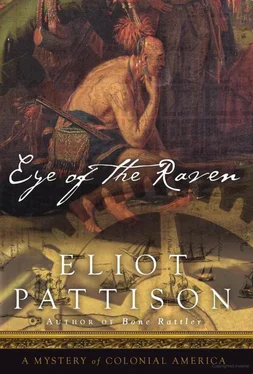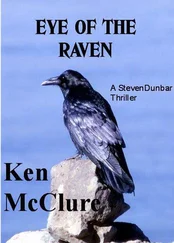Eliot Pattison - Eye of the Raven
Здесь есть возможность читать онлайн «Eliot Pattison - Eye of the Raven» весь текст электронной книги совершенно бесплатно (целиком полную версию без сокращений). В некоторых случаях можно слушать аудио, скачать через торрент в формате fb2 и присутствует краткое содержание. Год выпуска: 2010, ISBN: 2010, Издательство: Counterpoint Press, Жанр: Исторический детектив, на английском языке. Описание произведения, (предисловие) а так же отзывы посетителей доступны на портале библиотеки ЛибКат.
- Название:Eye of the Raven
- Автор:
- Издательство:Counterpoint Press
- Жанр:
- Год:2010
- ISBN:9781582437019
- Рейтинг книги:5 / 5. Голосов: 1
-
Избранное:Добавить в избранное
- Отзывы:
-
Ваша оценка:
- 100
- 1
- 2
- 3
- 4
- 5
Eye of the Raven: краткое содержание, описание и аннотация
Предлагаем к чтению аннотацию, описание, краткое содержание или предисловие (зависит от того, что написал сам автор книги «Eye of the Raven»). Если вы не нашли необходимую информацию о книге — напишите в комментариях, мы постараемся отыскать её.
Eye of the Raven — читать онлайн бесплатно полную книгу (весь текст) целиком
Ниже представлен текст книги, разбитый по страницам. Система сохранения места последней прочитанной страницы, позволяет с удобством читать онлайн бесплатно книгу «Eye of the Raven», без необходимости каждый раз заново искать на чём Вы остановились. Поставьте закладку, и сможете в любой момент перейти на страницу, на которой закончили чтение.
Интервал:
Закладка:
But condolences were given by the guilty party. Duncan knew better than to push the old woman to explain. As he struggled to understand her meaning, a familiar voice solved his dilemma.
"Skanawati is both war chief and peace chief," Conawago reminded him. Duncan did not know how long he had been there listening. "Our Skanawati has more of the peace in him. Perhaps his uncle had more of the war." Something about his day with the dead had calmed his friend. He was still distant, but the anxiety, the strange longing, was gone from his eyes.
As Stone Blossom nodded, another tear rolled down her cheek. Duncan's mind raced back to the words of the renegade Red Hand and, as he looked into the old woman's face, he realized they were probably true. The prior Skanawati, who had died of the pox the year before, had killed the first surveyor. The tribes may not have continued the violence on the survey line, but they may well have started it, playing to the hand of a distant conspirator.
"The spirits we need," the matriarch said in a tortured voice, are not the ones awakened by blood."
They sat in silence. Moses heaped more wood on the fire and joined them as they watched the sparks mingle with the stars. The spring frogs chirped.
"When that first surveyor died," Duncan asked, "was it known in Shamokin?"
"I don't understand," Stone Blossom replied.
"The killers now are trying to make it look like Iroquois from Shamokin are responsible for all the deaths."
It was Moses who answered. "There was some survey equipment. One of the warriors with the last chief sold it in Shamokin for rum. When he got drunk he did not mind speaking about what he and the old chief had done, killing an enemy of all our peoples."
Stone Blossom rose and disappeared into the nearest longhouse, returning a moment later to drop a doeskin packet into Duncan's lap. "I was going to bury it," she said. "It is tainted."
He unwrapped it to discover an elegant little wooden box, of a kind made for jewelry or keepsakes. It was artfully worked, with an inlaid pattern of diamonds across its front. But a crude design had been scratched into the hinged top, in the shape of a turtle. On the bottom was more scratching, though in very careful block letters. E Townsend, it said, 1756.
As Duncan turned with more questions a low rumble rose from the direction of the new grave. Someone was beating the great log drum.
"Johantty said you must join him after the moon rises, to sing the dead." Stone Blossom gestured toward a dark object at the edge of the ring. Conawago had retrieved his pack, with his pipes.
Duncan solemnly nodded. "Can you first tell me when Skanawati learned he was to be a negotiator for the new treaty?"
"He had already gone down the trail," the chiefs mother said. "A messenger was sent to him with the news from Old Belt. Johantty is one of our fastest runners. Even so Skanawati had gone very far west."
"But Skanawati had been here, preparing the rituals, readying for the move." It was the closest Duncan dared approach to the dream that had changed the chiefs plans.
Stone Blossom stared into the fire a long time. "I do not know you well enough," she said.
"All the leaders of my clan were killed," Duncan whispered to her. "I will not let it happen to yours."
The old woman studied him with new interest. "A message came from the other side. When I showed him he knew everything had changed."
"Showed him what, Grandmother?"
"I took him to the sacred place that once anchored our village. I showed him the crack in the world."
Although they left just after dawn the next morning, when they pulled their canoes onto the bank two miles upstream, Johantty was there with his three companions, tending a fire by a small sweat lodge. The youth had not slept, Duncan was certain, for the two of them had drummed and piped at the graveyard, looking over the river, long past midnight. Wary of asking more questions, Duncan watched as Conawago began stripping to a loincloth, then Johantty pointed to a small wooded island opposite the lodge. They had to cleanse themselves before venturing to the sacred place. Stone Blossom appeared from behind a shrub, wearing nothing but a woolen breechcloth herself, and entered the lodge, into which the other youths were carrying hot stones cradled with sticks. Johantty tossed Duncan a length of wool. Duncan stripped and arranged it like a kilt before stepping into the purifying steam of the lodge.
An hour later Duncan warily watched the island as Conawago, Stone Blossom, and he approached it. From a distance it had appeared to be just one more wooded hump of rock in the center of the river, an island perhaps two hundred feet long. But in a river filled with little tree-covered islands this one stood out for its dramatic rock formations and clump of misshapen beech trees at the northern end.
Duncan kept as silent as his guide, watching the old woman, then mimicking her action as she plucked a sprig of sweet cedar from a small tree. Yet even when she stopped and placed the sprig on a flat slab at the highest point of the gnarled ledge rocks and looked at him expectantly, he did not understand. But then he heard the gasp of surprise behind him, and he turned to see Conawago staring at the rock at their feet.
What Duncan had taken to be cracks and seams in the rock were carvings, dozens of primitive symbols of animals and men, trees and fish. They were very old, even ancient, and the effort to make them with stone-and-wood tools would have been extraordinary. The styles and size varied, some of the carved petroglyphs so worn by weather that they were barely visible. And almost none were entirely visible, for they had been attacked.
Hammers or axes had been taken to the signs, cracking and splintering the rock, obliterating the stone so that in some cases there was nothing but a rough, shallow bowl of freshly exposed rock left.
But that was not the worst of the damage. With a long, quivering wail that sent a chill down Duncan's spine, Stone Blossom knelt at the largest of the carvings, a three-foot-long image of a raven. It was the centerpiece, as if the bird were the leading deity. But the raven was dead, split down the center by a narrow crevasse that continued for over ten feet to the end of the ledge. As the old woman laid her arms on either side of the image and bent low, whispering to it, Duncan followed the crack to the side of the exposed ledge and saw the black burn marks there. Knowing it was made by gunpowder did not change the effect of seeing the crack. It was gut-wrenching. The most remarkable Indian shrine he had ever seen had been destroyed, desecrated by European tools. He could not argue with Stone Blossom's perception that it portended something terrible for her world.
"It was here we came to on festival days," Stone Blossom explained when she was done. "When I was a child, when I was a young woman, when I was a wife and mother. Even as a boy Skanawati would come and sit here for hours. It was always a place of great power." Her voice choked with emotion as she gazed over the destruction. When she spoke again it was in her native tongue, answering questions softly asked by Conawago.
Duncan roamed around the wide-open ledge that gave a view of the river in every direction. The symbols were everywhere, and as he found several still intact at the rim of the broad ledge he thrilled at the thought of the ancient hands that had reverently chiseled them into the stone. He touched one of the overhanging beech trees, twisted and stunted by the river winds, and saw how thick its trunk was. It too was ancient. It had witnessed the reverence, heard the chants that would have been used to empower the completed figures.
He paused, studying the way the rock fell away at the north end. Crude steps, long ago overgrown with lichen, had been cut there. He bent and pushed through the laurel along the edge, dropped off the ledge, and followed the barest shadow of a trail that ran from the bottom step. Broken stems hanging over the bushes indicated that others had recently found the shallow cave at the end of the trail.
Читать дальшеИнтервал:
Закладка:
Похожие книги на «Eye of the Raven»
Представляем Вашему вниманию похожие книги на «Eye of the Raven» списком для выбора. Мы отобрали схожую по названию и смыслу литературу в надежде предоставить читателям больше вариантов отыскать новые, интересные, ещё непрочитанные произведения.
Обсуждение, отзывы о книге «Eye of the Raven» и просто собственные мнения читателей. Оставьте ваши комментарии, напишите, что Вы думаете о произведении, его смысле или главных героях. Укажите что конкретно понравилось, а что нет, и почему Вы так считаете.












